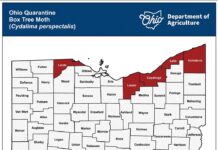The River Cafe is a restaurant located smack dab on the Ohio-Michigan line. The kitchen is in Ohio; the dining room is in Michigan.
For more than 10 years, the family-run Tyler Meat Company in Toledo provided meat products to the River Cafe. But they had to give up the account because the Ohio meat plant — a state-inspected meat plant — could not ship its products across state lines. Since the meat was being consumed in the Michigan part of the restaurant, authorities told the restaurant it was not in compliance with the USDA.
Ironically, Tyler Meat Company purchases 98 percent of its product from federally inspected operations and only 2 percent from state-inspected plants.
Long battle
The battle to lift the ban on interstate shipments of state-inspected meat and poultry has lasted for almost 30 years. Maybe longer.
If Congress overrides the expected presidential veto of the farm bill, and the Food, Conservation and Energy Act becomes law, the battle will be over.
It just didn’t make sense: Meat and poultry products from nearly 40 countries could be shipped and sold anywhere in the United States, but state-inspected products could not, even though the inspection programs had to be “at least equal” to the federal system. State-inspected venison, pheasant, rabbit and other meats could cross state lines, but beef, pork, lamb and goat could not.
Under the Federal Meat Inspection Act, small plants could choose to be inspected by state, rather than federal, inspectors. But if they chose state inspection, they could not ship their products across state lines.
Here in Ohio, the ban on interstate meat shipment affected about 176 state-inspected livestock slaughtering plants (1995 figures are the latest ones available), which handled about 17 percent of the total livestock slaughtered in the state. Only the state’s 19 federally inspected plants could ship across the state’s borders.
And to compound the frustration, food safety standards have been the same for state and federal inspected establishments since 1996.
Change is coming
The good news is that under the new farm bill, plants with fewer than 25 employees in state meat or poultry inspection programs can get “federal inspection” from state inspectors, and use a USDA label on their products. To do so, plants have to agree to all federal inspection requirements.
As we move toward more local branding, direct marketing and niche development, the ability of small meat companies to be able to ship across state lines will be a solid economic benefit and help build the local food chain. Food safety will not be compromised.
Chalk one up — at long last — for the little guy.
Small companies can’t, however, immediately jump into interstate meat shipment. This is the federal government, remember, and the USDA has up to 18 months to create the new rules and regs for this new program.
That’s a long time. Let’s hope the USDA kicks the rule-making process into high gear.











